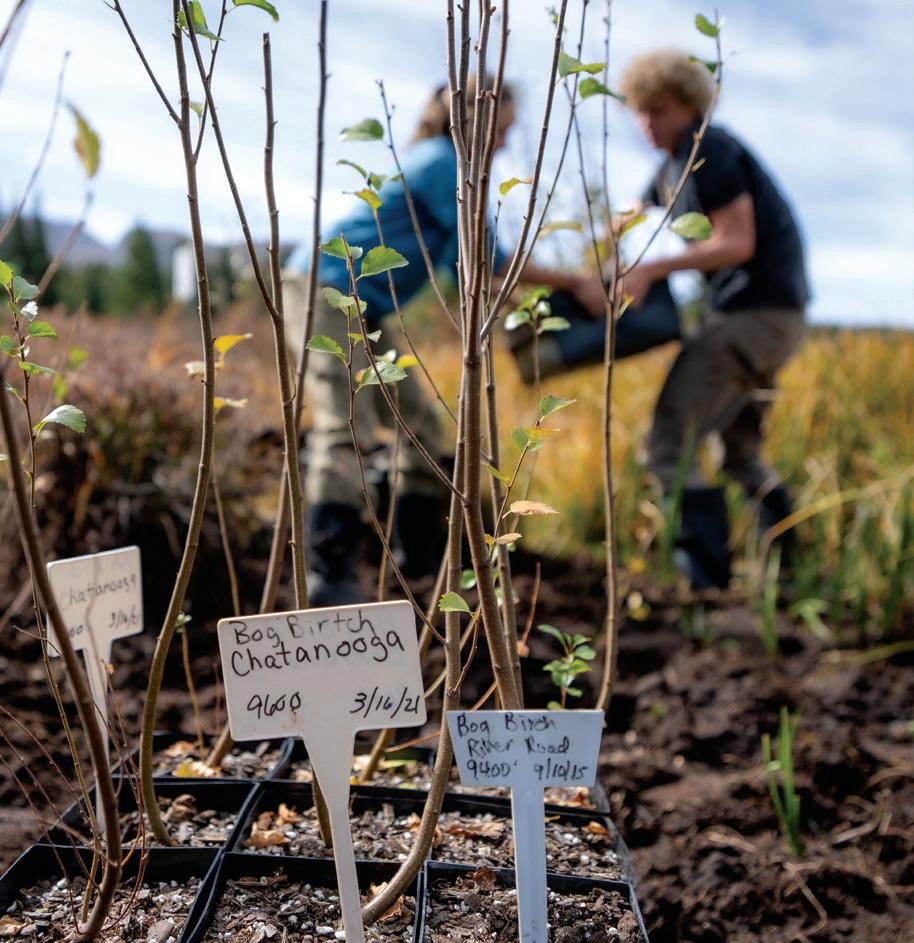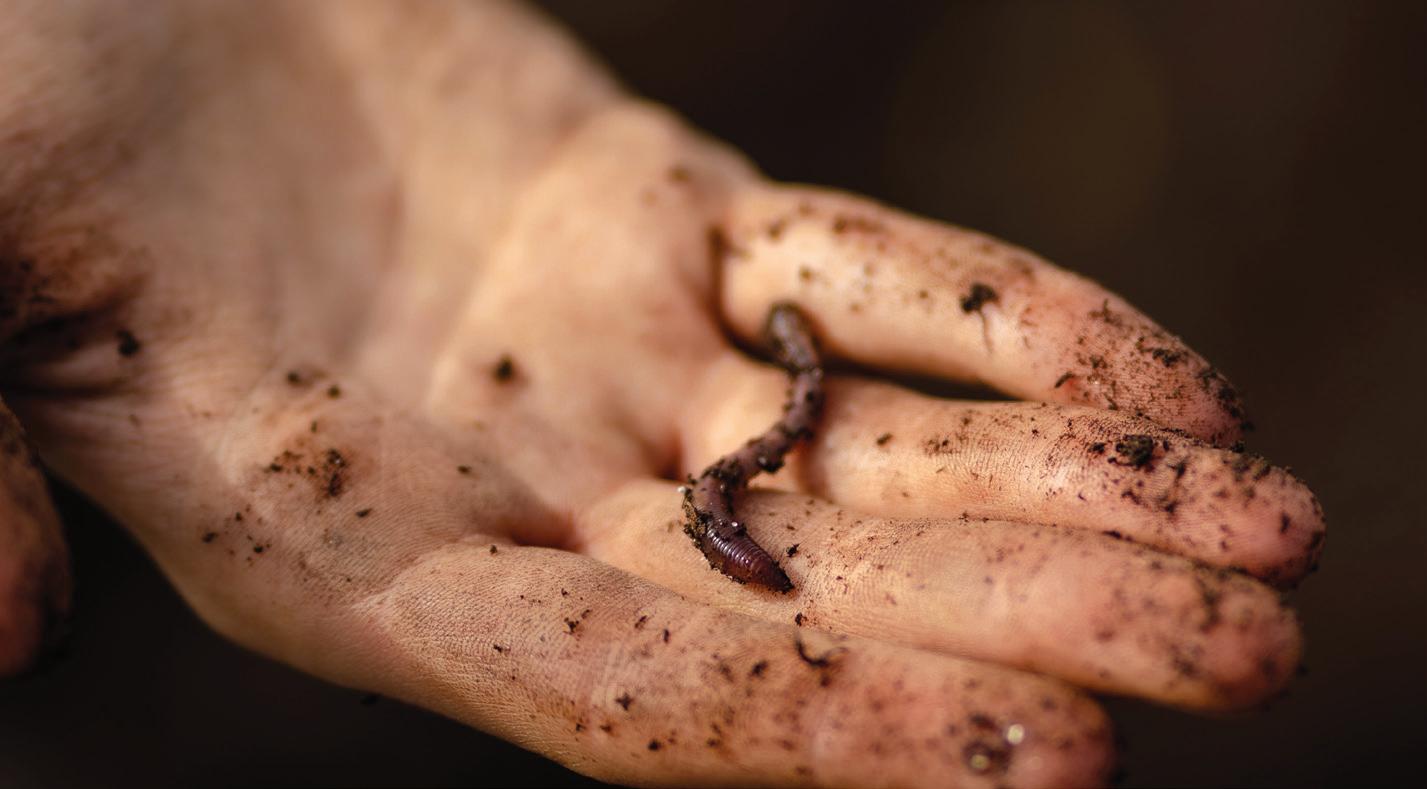
4 minute read
Durango Kids
Photos by Cole Davis
Opportunity overflows for regional students
With Mountain Studies Institute and Environment & Climate Institute
by Joy Martin
On a stunning September Sunday, eight high school students from Bayfield, Durango, and Silverton gathered at Molas Pass to establish 173 bog birch plants so we can all have cleaner drinking water. Instead of playing video games or mall walking, these teenagers chose to spend their weekend restoring the wetlands that filter San Juan Mountain snowflakes, water that eventually drifts down the Animas River and into civilization.
“If rain forests are the lungs of the earth, then wetlands are the kidneys of our ecosystem,” says Amanda Kuenzi, community science director at the Mountain Studies Institute in Silverton. “Water that flows out of a wetland is cleaner than what flows in, creating an invaluable asset to our watershed, considering how many heavy metals are naturally occurring in our geology.”
The alpine wetland at Molas is called a fen, which is known as a biodiversity hotspot and a unique geographical feature that takes thousands of years to develop. Besides eating the plants that call the Molas fen home, elk and deer wallow in the mud, degrading this special ecosystem. One way to counteract the harm done is by planting bog birch, a species that’s native to the area.
“MSI calls it ‘service learning,’ because the students are helping us regenerate valuable wetlands while they’re also learning plant ecology,” says Kuenzi.
This type of fen wetland restoration extended to Ophir Pass on National Public Lands Day, a day before the high schoolers ascended to the top of Molas Pass. Sixteen Fort Lewis College students from FLC’s Environmental Center joined in the fun, positioning 81 bog birch plants, covering a steep burn area with jute mesh, and collecting sedge seeds for propagation. Kuenzi says college students often evolve these field experiences into material for their senior capstone projects. These service-learning opportunities offer a snapshot of the Mountain Studies Institute’s myriad offerings that promote a stewardship ethic for public lands. To more effectively involve the community’s youth, MSI recently partnered with the Environment & Climate Institute, hosted by Fort Lewis College, to provide high school students from across the region with opportunities to study climate-change effects on the San Juan Mountains’ unique environment. The ECI launches with a summer intensive kickoff held at FLC. Over the course of the school year, student cohorts from five regional school districts, including Silverton, Bayfield,


Durango, Ignacio, and Pagosa Springs, embark on field trips to wetlands (like the Molas fen), ranches, and other diverse ecosystems around the Four Corners. In addition to the expertise of MSI staff, ECI students glean insight from six teachers who serve as mentors. Each student chooses an environmental topic to research independently, then presents their findings to community members, land managers, elected officials, and BLM and Forest Service representatives at the San Juan Resilience Youth Summit held in February.
“The Summit provides an authentic audience for the students,” says Kuenzi. “It’s always exciting and surprising to see what questions and ideas students bring to the table. Those student findings can really lead us to the next question and keep all of us digging further. We can look to these students for real solutions, so it’s our job to keep empowering them to investigate their questions.”
“We originated with the dream of utilizing the San Juan Mountains as a classroom without walls for the youth and communities of the region,” says Marcie Bidwell, executive director of MSI. “From the very start, we’ve been initiating new and creative programs for getting kids involved and putting science into action.”
Driven by a science-by-doing approach, MSI partners with public and private organizations to collaborate on a range of citizen-science projects, from corporate work and volunteer days to teacher trainings and classroom materials. The 20-year-old organization is open to expanding, so long as efforts focus on advancing mountain science, empowering communities through education and action projects, and finding innovative solutions to address environmental challenges.
One recent fire education program focused on helping revegetate the 416 burn area using seed balls made of a restoration seed mix, sand, and compost, forming a soft clay. Bidwell explains that the clay helps keep the seeds from being eaten by birds. Under the guidance of MSI and the National Forest Service, volunteers of all ages toss the seed balls into the landscape, and Mother Nature takes care of the rest.
“As we become more aware of the impacts of climate on our community, it’s imperative that we create opportunities for youth that empower them to make a difference,” says Bidwell. “Otherwise, climate change is so overwhelming that people either give up or don’t know where to start. No matter how small a seed ball may be, these are important steps to building that confidence.”
From counting alpine plants at climate research sites near Lake City to planting native trees along sections of the Mancos River, MSI spearheads the gamut of educational events, restoration projects, internships, and hands-on experiences. This January, MSI is proud to celebrate 20 years of service in the San Juan Mountains and invites students and parents to participate in festivities held throughout 2022.
“Ultimately, we’re all trying to work hard to keep our bright young people here,” says Bidwell. “To have these views that they could do this work here, that they can get outside, get involved, help heal the environment, and build community, that’s why we do what we do.”
Discover Mountain Studies Institute’s 20th anniversary events at mountainstudies.org. To explore opportunities with the Environment & Climate Institute for high school students from Silverton, Durango, Bayfield, Ignacio, and Pagosa Springs, please visit fortlewis.edu/eci.












